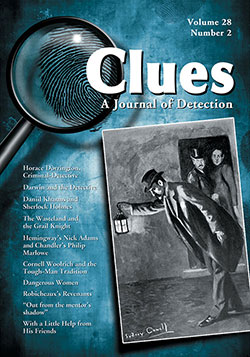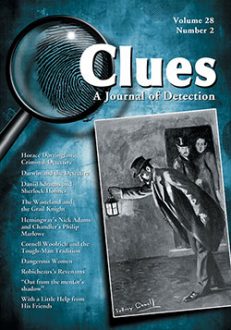Clues: A Journal of Detection, Vol. 28, No. 2 (Fall 2010)
Print Back Issue$30.00
In stock
About the Book
BACK ISSUE
This is a single back issue only. To order a current subscription, or for more information, please visit the journal’s web page at CluesJournal.com. Back issues from earlier volumes of Clues are available for order subject to availability. Also, single issues of the current volume may be ordered one at a time. Individuals may order back issues directly from our online catalog, and the charge for individuals is $30 (excluding postage). Issues from Volume 33 to the present are also available in ebook format on Kindle, Nook and Google Play.
The charge for single issues for institutions is $75 per issue (excluding postage). If your institution requires a back issue, please contact us to order at the appropriate rate.
About the Author(s)
Bibliographic Details
Executive Editor Margaret Kinsman
Managing Editor Elizabeth Foxwell
Format: softcover (7 x 10), back issue
Pages: 116
Bibliographic Info:
Copyright Date: 2010
ISSN 0742-4248
Imprint: McFarland
Table of Contents
Introduction: Celebrating the Familiar and Unfamiliar
MARGARET KINSMAN 5
Horace Dorrington, Criminal-Detective: Investigating the Re-Emergence of the Rogue in Arthur Morrison’s The Dorrington Deed-Box (1897)
CLARE CLARKE 7
Regarding The Dorrington Deed-Box (1897), Arthur Morrison’s critically neglected second contribution to the post–Sherlock Holmes detective short story genre, the author argues that as Dorrington is both a detective and a criminal, and the victim is the narrator, the stories subvert the usual reassuring moral and formal conventions of the late–Victorian detective genre.
Darwin and the Detective: Aspects of the Darwinian Worldview and the Sherlock Holmes Stories of Arthur Conan Doyle
HILARY A. GOLDSMITH 19
Charles Darwin’s The Origin of Species (1859) was written in the same year that Sherlock Holmes creator Arthur Conan Doyle was born. The author examines relationships between the work of Darwin and Conan Doyle, and suggests ways in which the Sherlock Holmes adventures aided the assimilation of evolutionary theory into late–Victorian thought.
Daniil Kharms and Sherlock Holmes: Between Imitation and Deconstruction
LISANNE SAUERWALD 29
Daniil Kharms (1905–42) is known as an author of Russian absurd literature. It is generally overlooked that the pseudonym Kharms encodes Sherlock Holmes’s Russian name of Kholms. An intertextual comparison between Kharms and Holmes shows how Arthur Conan Doyle’s Holmes made his way into Russian absurd literature.
The Wasteland and the Grail Knight: Myth and Cultural Criticism in Detective Fiction
SUSAN ROWLAND 44
The author argues that all detective fiction is essentially mythical, with the story of paradise rendered as a wasteland until the hero, whether feminine or masculine, completes the quest for the grail. The author provides examples from the work of Agatha Christie, Reginald Hill, and Michelle Spring.
Hemingway’s Nick Adams and the Creation of Raymond Chandler’s Philip Marlowe
MASON SMITH 55
Ernest Hemingway’s Nick Adams greatly influenced Raymond Chandler, with echoes of Adams in detective Philip Marlowe’s point of view. Adams’s world has violent men speaking the street language of the day, while Adams’s interior, narrative voice reveals a sensitive side. Marlowe’s tough-guy persona contrasts with his sensitive, British-educated, first-person narration.
Cornell Woolrich and the Tough-Man Tradition of American Crime Fiction
CHRISTINE PHOTINOS 61
In recent years, and with increasing frequency, Cornell Woolrich has been categorized as a member of the hard-boiled school of American crime fiction and one of its most important early practitioners. Objections to this categorization notwithstanding, Woolrich’s stories provide critical counterpoints to the work of his better-known contemporaries and to some of the taken-for-granted conventions of early hard-boiled crime fiction.
Dangerous Women: Vera Caspary’s Rewriting of Lady Audley’s Secret in Bedelia
LAURA VORACHEK 69
Considering Vera Caspary’s Bedelia as a reimagining of Mary Elizabeth Braddon’s Lady Audley’s Secret allows for a new critical interpretation that refutes the typical view of Bedelia as reinforcing traditional gender roles. Instead, Caspary critiques World War II America by bringing Victorian concerns with female roles into the twentieth century.
Robicheaux’s Revenants: The Use and Function of the Revenant in James Lee Burke’s Dave Robicheaux Novels
PATRICIA GAITELY 77
In James Lee Burke’s detective novels, Burke establishes Dave Robicheaux as representative of the Cajun culture through the inclusion of supernatural elements. Burke’s In the Electric Mist with Confederate Dead, Burning Angel, and Black Cherry Blues include examples of figures from Robicheaux’s past returning from beyond the grave to assist him both professionally and personally.
“Out from the mentor’s shadow”: Siobhan Clarke and the Feminism of Ian Rankin’s Exit Music (2007)
LAURA SEVERIN 87
The author focuses on Ian Rankin’s Exit Music as a feminist rewriting of the detective genre and his most optimistic consideration of Scotland’s future postdevolution. Siobhan Clarke’s imminent replacement of John Rebus signals an evolution in patriarchal power structures and the possibility of change, both for Scotland and for crime fiction.
With a Little Help from His Friends: The Functions of Diversity in Craig Johnson’s Walt Longmire Series
RACHEL SCHAFFER 95
Craig Johnson’s Walt Longmire series features a protagonist who, together with his best friend, serves as champion of, intermediary between, and observer of a variety of nondominant groups, including women and Northern Cheyenne. The blend of mystery and cultural exploration highlights the importance of tolerance and mutual understanding for all people, regardless of group membership.
BOOK REVIEWS
Michael Slater. Charles Dickens: A Life Defined by Writing. CHRISTOPHER PITTARD 105
Kate Macdonald. John Buchan: A Companion to the Mystery Fiction. MONICA LOTT 107
Dennis Broe. Film Noir, American Workers, and Postwar Hollywood. JOSH STENGER 109
Index, Volume 28 113
Author Guidelines are on page 116
Book Reviews & Awards
- “Clues is a must-have for readers and writers of crime fiction. Scholarly, thought-provoking, wide-ranging in its topics, Clues covers the crime and thriller map.”—Sara Paretsky
- “A. Conan Doyle, notoriously resentful of Sherlock Holmes’s success, liked to scorn ‘police romances’ as less significant and worthy of his talents than his other literary work. If he could have read Clues, the thinking mystery reader’s journal, he would surely have felt differently—and learned much he never realized himself about even his own landmark contribution to the genre, from which so much else by others has flowed.”—Jon Lellenberg, U.S. agent for the Arthur Conan Doyle estate
- “I love reading Clues. Every issue provides thought-provoking, well-researched articles. The variety and scope of the material found in Clues makes an unparalleled, ongoing contribution to our understanding of the role of crime fiction in our culture, and the genre’s reflection of its time and society.”—Jan Burke, Edgar-winning author of The Messenger (2009)
- “Clues is an important journal. It carries the torch of tradition that is the backbone of detective fiction. It goes below the surface and gets to the heart of what makes the genre so fascinating and valid today”—Michael Connelly, author of the Harry Bosch novels, including The Overlook (2007)
- “for erudite and fascinating truths about mysteries, follow the clues to Clues, the scholarly journal that is an essential resource for every serious student of the mystery”—Carolyn Hart, author of Death Walked In (2008)
- “with scholarship ranging from Poe to Peters, nothing beats Clues”—Joan Hess, author of Mummy Dearest (2008).





